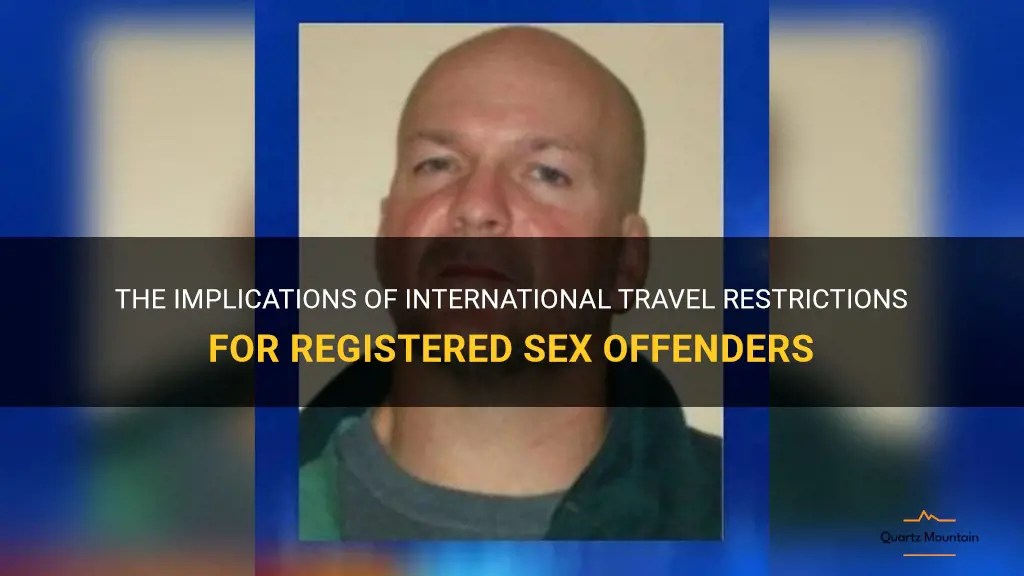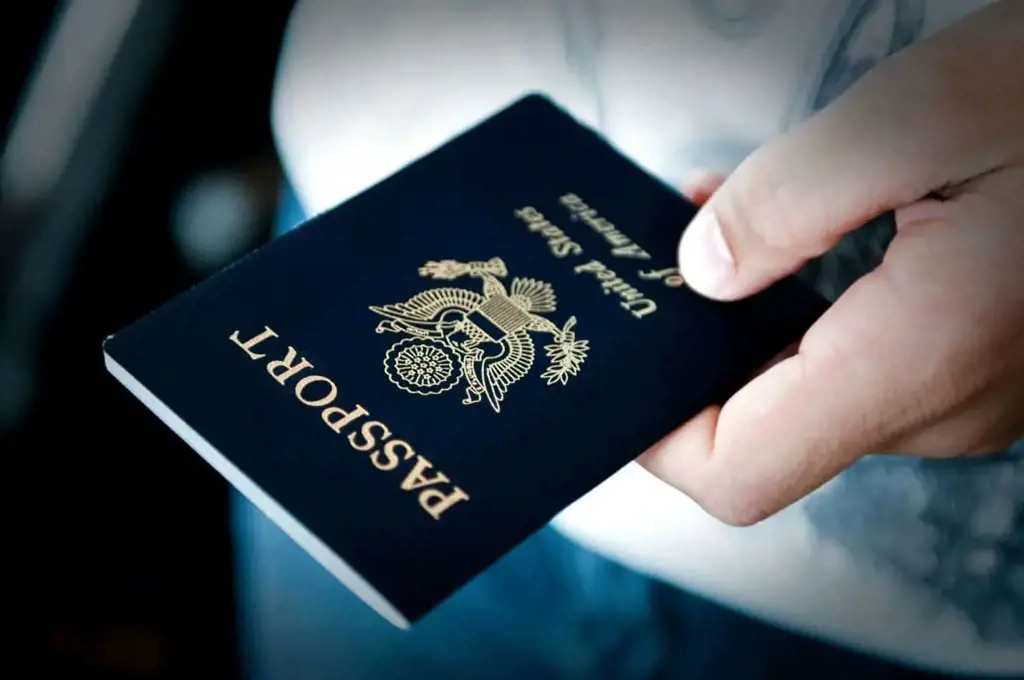
Every year, millions of people around the world set off on exciting adventures, exploring new countries and experiencing different cultures. However, for a certain group of individuals, these wanderlust dreams are shattered due to international travel restrictions. Registered sex offenders, no matter their intentions or rehabilitation progress, often face severe limitations when it comes to traveling abroad. While some argue that these restrictions are necessary to protect potential victims, others believe that they hinder the rehabilitation process and perpetuate stigma against this marginalized group. In this article, we will delve into the intricate world of international travel restrictions for registered sex offenders, exploring the motivations behind these regulations and their implications on individuals seeking redemption and a chance at a new beginning.
What You'll Learn
- What are the current international travel restrictions for registered sex offenders?
- Are there any countries that have stricter travel restrictions for registered sex offenders compared to others?
- How do countries enforce travel restrictions for registered sex offenders?
- Are there any legal challenges to international travel restrictions for registered sex offenders?
- Are there any efforts to establish international guidelines or agreements regarding travel restrictions for registered sex offenders?

What are the current international travel restrictions for registered sex offenders?

International travel restrictions for registered sex offenders vary by country. Some countries have strict regulations in place to prevent registered sex offenders from entering their borders, while others may have more lenient policies.
In the United States, for example, registered sex offenders are required to notify their local authorities of any planned international travel. The authorities then share this information with the U.S. Marshals Service, who may notify the receiving country of the individual's travel plans. This allows the receiving country to determine whether or not to permit entry.
Many countries have similar systems in place, where registered sex offenders are required to disclose their status and travel plans to their local authorities. These authorities then share the information with other countries' law enforcement agencies, who make the final decision on whether or not to admit the individual.
Each country has its own criteria for determining whether or not to deny entry to a registered sex offender. Some factors that may be considered include the severity of the offense, the length of time since the offense was committed, and any rehabilitation or treatment that the individual has undergone.
In general, countries with stricter policies towards registered sex offenders may deny entry to individuals with any sort of sex offense conviction, regardless of the severity or time that has passed. Other countries may be more lenient and allow individuals with certain types of less serious offenses to enter.
It is important for registered sex offenders to research the specific entry requirements of the country they intend to visit well in advance of their trip. Failure to comply with these requirements can result in denial of entry, deportation, or other legal consequences.
It is also worth noting that some international organizations, such as Interpol, maintain databases of registered sex offenders that can be accessed by member countries. This further increases the chances of being detected and denied entry if a registered sex offender attempts to travel internationally without following the appropriate procedures.
In conclusion, the current international travel restrictions for registered sex offenders vary by country. It is important for individuals with a sex offense conviction to research and comply with the entry requirements of the country they intend to visit to avoid any legal consequences.
What You Need to Know About Travel Restrictions to St. Maarten
You may want to see also

Are there any countries that have stricter travel restrictions for registered sex offenders compared to others?

When it comes to travel restrictions for registered sex offenders, it is important to note that different countries have different laws and regulations in place. Some countries have stricter travel restrictions for registered sex offenders compared to others, while some may have no specific restrictions at all.
One country that is known for its strict travel restrictions for registered sex offenders is the United States. The Adam Walsh Child Protection and Safety Act, which was signed into law by President George W. Bush in 2006, requires registered sex offenders to provide notice of any planned international travel to their local law enforcement agency before departing the country. This information is then shared with the destination country's law enforcement agencies. In some cases, the destination country may deny entry to registered sex offenders.
In addition to the United States, other countries have implemented their own travel restrictions for registered sex offenders. For example, Canada has the Sex Offender Information Registration Act, which requires registered sex offenders to provide notice of any international travel to their local law enforcement agency. The Royal Canadian Mounted Police then shares this information with foreign law enforcement agencies, who may then deny entry to registered sex offenders.
Australia is another country that has strict travel restrictions for registered sex offenders. The Australian government has implemented the Crimes Legislation Amendment (Sexual Offences Against Children and Community Protection Measures) Act 2006, which allows for the cancellation of passports for registered sex offenders. This means that registered sex offenders may be denied an Australian passport or their existing passport may be cancelled if they are found to be a risk to children overseas.
While these are just a few examples of countries with strict travel restrictions for registered sex offenders, it is important to note that travel restrictions can vary greatly from country to country. In some cases, countries may have no specific travel restrictions for registered sex offenders, while others may have stricter laws in place. It is always important for registered sex offenders to research the travel restrictions of the country they plan to visit and comply with any necessary regulations to avoid legal issues.
Understanding the Current Travel Restrictions in Riviera Maya
You may want to see also

How do countries enforce travel restrictions for registered sex offenders?

Countries around the world have implemented various strategies to enforce travel restrictions for registered sex offenders. These restrictions are put in place to protect society from potential harm and to monitor the movements of individuals convicted of sex crimes. Here are some common ways that countries enforce these restrictions.
Passport Notifications:
One way countries enforce travel restrictions for registered sex offenders is by notifying their passport authorities of their status. When a sex offender is convicted, their information is entered into a central registry. This registry is then shared with the passport authorities, who can flag their records and restrict their ability to travel internationally. This allows countries to prevent sex offenders from leaving or entering their territory.
Border Control:
Border control agencies play a crucial role in enforcing travel restrictions for sex offenders. These agencies have access to databases containing information about registered sex offenders. When a person attempts to cross a border, their passport or identification is usually checked against these databases. If a match is found, border control officers can take appropriate action, such as denying entry or notifying the relevant authorities.
International Cooperation:
Countries also enforce travel restrictions for registered sex offenders through international cooperation. Many nations have signed agreements and treaties that allow for the exchange of information about sex offenders between countries. This enables countries to be aware of the presence of sex offenders attempting to enter their territory and take appropriate action.
Monitoring Systems:
Some countries have implemented monitoring systems to keep track of registered sex offenders. These systems may include electronic monitoring devices, such as ankle bracelets, which allow authorities to track the movements of offenders. If a registered sex offender violates their travel restrictions, authorities can be alerted and take appropriate action.
Notification Requirements:
Countries may also have notification requirements in place for registered sex offenders. This means that offenders are required to notify authorities of their travel plans in advance. Failure to comply with these requirements can result in legal consequences. These notification requirements help authorities keep track of the movements of sex offenders and ensure compliance with travel restrictions.
It's important to note that the specific enforcement measures and strategies may vary from country to country. Each nation has its own laws and regulations in place to address the issue of travel restrictions for registered sex offenders. However, the ultimate goal remains the same - to protect society and prevent potential harm by monitoring the movements of convicted sex offenders.
California Travel: Understanding the Current Restrictions and Updates
You may want to see also

Are there any legal challenges to international travel restrictions for registered sex offenders?

Many countries around the world have placed restrictions on the travel of registered sex offenders. These restrictions are often put in place to protect the citizens of a country from potential harm. However, these travel restrictions have also faced legal challenges in recent years.
One of the main concerns in these legal challenges is whether these travel restrictions violate the rights and liberties of registered sex offenders. Some argue that these restrictions are a form of punishment that goes beyond the original sentence imposed on the offender. They believe that once an offender has completed their sentence, they should be allowed to travel freely without any additional restrictions.
In some cases, these legal challenges have been successful in striking down or modifying travel restrictions. For example, in the United States, the Supreme Court has ruled that blanket travel bans for registered sex offenders are unconstitutional. The court stated that these bans violated the offenders' right to travel, which is protected under the Constitution.
However, it's important to note that these legal challenges can vary from country to country. Each country has its own laws and regulations regarding travel restrictions for registered sex offenders. Some countries may have more lenient restrictions, while others may have stricter rules in place.
The justification for these restrictions often involves concerns about public safety and preventing future crimes. Governments argue that by placing restrictions on the travel of registered sex offenders, they can reduce the risk of reoffending and protect their citizens.
While there may be legal challenges to these travel restrictions, it's important to recognize that the protection of public safety is also a key consideration in these cases. Governments must balance the rights and liberties of the offender with their duty to protect their citizens from potential harm.
In conclusion, there have been legal challenges to international travel restrictions for registered sex offenders. Some argue that these restrictions violate the rights and liberties of the offenders, while others believe they are necessary for public safety. The outcome of these legal challenges can vary from country to country, and each government must carefully consider the balance between protecting their citizens and respecting the rights of individuals.
Understanding the Current Travel Restrictions in Illinois: What You Need to Know Before You Go
You may want to see also

Are there any efforts to establish international guidelines or agreements regarding travel restrictions for registered sex offenders?

In recent years, there has been a growing recognition of the need to protect communities from registered sex offenders, particularly when it comes to their travel. Many countries have implemented their own laws and regulations to restrict the movements of these individuals, but there is currently no international agreement or guideline in place. However, there have been some efforts to address this issue on a global scale.
One of the main challenges in establishing international guidelines or agreements for travel restrictions for registered sex offenders is the diversity of laws and regulations across different countries. Each nation has its own legal framework and approach to dealing with registered sex offenders, making it difficult to reach a consensus.
Nevertheless, some organizations and initiatives have taken steps towards addressing this issue. The International Criminal Police Organization (INTERPOL) has been working on enhancing international cooperation to combat sexual offenses, including the establishment of international guidelines for the management of registered sex offenders. Their efforts aim to promote information sharing and collaboration between different countries to ensure the effective monitoring and restriction of these individuals' movements.
Additionally, some countries have started bilateral initiatives to address the issue of travel restrictions for registered sex offenders. For example, the United States has established agreements with various countries to share information about individuals who are prohibited from traveling due to their criminal history. These agreements allow for the exchange of information and coordination between countries to prevent registered sex offenders from crossing international borders.
While these initiatives are encouraging, there is still a long way to go in establishing comprehensive international guidelines or agreements for travel restrictions of registered sex offenders. Many challenges need to be addressed, including differences in legal frameworks, sharing of information, and ensuring the protection of individuals' rights.
Countries will need to find common ground and work together to develop a framework that respects the principles of justice while prioritizing public safety. This may involve enhanced information sharing mechanisms, standardized risk assessment methods, and effective communication between law enforcement agencies across borders.
In conclusion, there are ongoing efforts to establish international guidelines or agreements on travel restrictions for registered sex offenders. Organizations like INTERPOL are working towards enhancing international cooperation, and some countries have bilateral agreements in place. However, there is still a need for a comprehensive and unified approach to address the diversity of legal frameworks and ensure community safety. It is crucial for countries to collaborate and work together to protect their communities from the risks posed by registered sex offenders.
Understanding Army PCS Travel Restrictions: What You Need to Know
You may want to see also
Frequently asked questions
It depends on the country they wish to travel to. Each country has its own laws and regulations regarding the entry of registered sex offenders. It is essential to research and understand the policies of the specific country before making any travel plans.
Registered sex offenders typically need to provide their passport information, including the passport number, expiration date, and country of issuance, when traveling internationally. Additionally, some countries may require them to disclose their criminal history or provide other relevant documentation.
Yes, it is possible for registered sex offenders to be denied entry to certain countries. Many nations have strict restrictions on allowing registered sex offenders to enter their borders, and immigration authorities have the right to deny entry based on criminal history or other factors deemed relevant to public safety.
Failing to report international travel as a registered sex offender can have severe consequences. It is typically a violation of the conditions or terms of a registered sex offender's supervision or probation. The consequences can include legal penalties, such as fines or imprisonment, as well as potential repercussions upon return to their home country, such as increased monitoring or stricter supervision.







